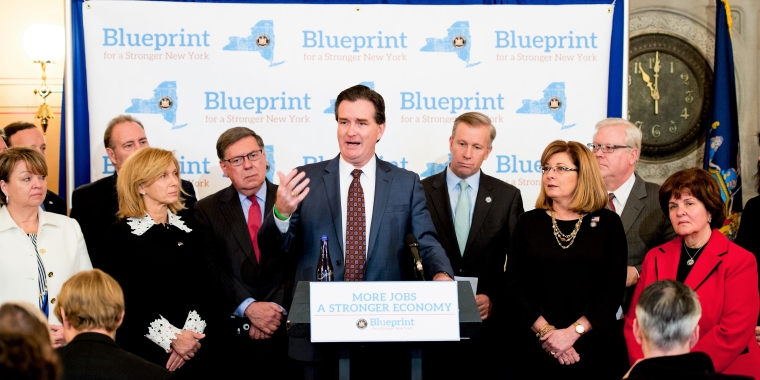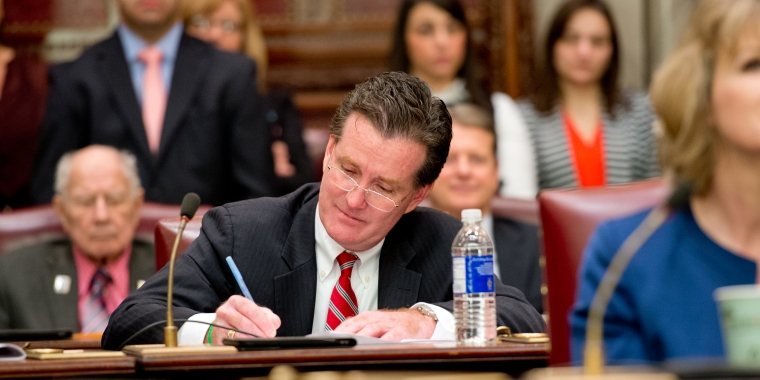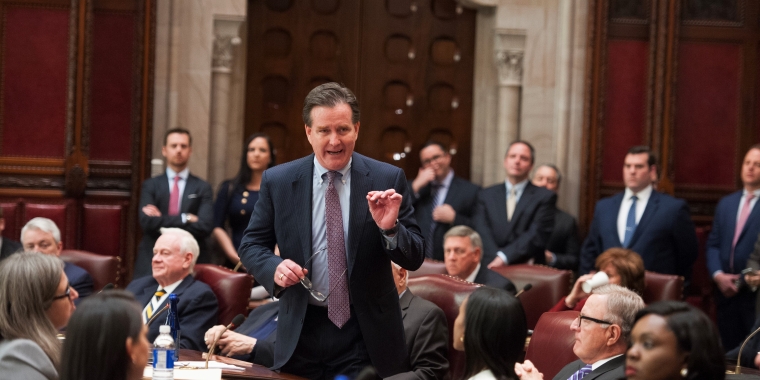
Senator Flanagan Introduces Legislation to Ban Synthetic Marijuana
John J. Flanagan
March 25, 2010
-
ISSUE:
- Controlled Substances
Senator John Flanagan (2nd Senate District) today introduced legislation to ban the sale of synthetic marijuana products that are being smoked by teenagers as an alternative to marijuana. The fake drug is legally available under a variety of names like K2, Spike 99 and Spice at stores throughout New York State including on Long Island and just blocks away from the State Capitol in Albany.
“This legal substitute is as powerful as real marijuana but it is completely unregulated in our state. That means that a 12-year-old could walk into a store today and purchase this product to get high legally which is outrageous. While the danger in using this drug is clear, even clearer is the fact that its availability sends the wrong message to the very kids we are trying to help stay away from drugs and it must be stopped.
This synthetic is composed of a mix of herbs and spices that are laced with a powerful psychotropic drug or synthetic cannabinoids (pot-like chemicals) that mimic the effect of getting high on marijuana.
Dangerous side-effects have been reported by those using the synthetic marijuana including hallucinations, vomiting, agitation, increased heart rate, elevated blood pressure and other adverse conditions. The United States Drug Enforcement Administration (DEA) has listed the chemicals on its list of Drugs and Chemicals of Concern.
Along with its availability in head shops (stores that specialize in selling drug paraphernalia), smoke and tobacco stores and novelty shops, it can also be purchased through the mail or on the Internet.
The product, which is often marked as incense or potpourri sells for an average of $30 to $40 per three gram bag which is a price that is comparable to what an individual would pay on the street for illegal marijuana.
The chemicals that would be banned under Senator Flanagan’s legislation have never been tested for safety in humans as they were created for experimental use in animals and cell cultures. John W. Huffman of Clemson University, who created the synthetic cannabinoids said that smoking these dangerous compounds is “… like playing Russian roulette. You don’t know what it’s going to do to you.” He added, “People who use it are idiots.”
This week, Kansas became the first state to ban the synthetic cannabinoids used to make products like K2 and Spice. Legislation is also pending in Kentucky, Missouri and Tennessee.
Senator Flanagan has long been a sponsor of separate legislation to prohibit the sale and distribution of salvia divinorum which is a legal hallucinogen that can be more powerful than LSD. According to the Drug Enforcement Agency (DEA), Salvia Divinorum is chewed or smoked to induce illusions and hallucinations, the diversity of which is described by users as similar to those induced by ketamine, mescaline, or psilocybin. It is currently under review by the medical and scientific community to determine if it should be classified as a controlled substance.
That legislation has passed the Senate a number of times but has been stalled in the Assembly.
Senator Flanagan’s synthetic marijuana legislation (S.7081) would ban the sale or distribution of products containing the synthetic cannabinoids: CP47, 497, HU-210, HU-211, JWH-108, JWH-073 for recreational use. Those convicted of knowingly selling or distributing synthetic cannabinoids would face a civil penalty of up to $500.
“At a time when we are seeing an epidemic rise in heroin use, anything that has the potential to worsen that problem must be dealt with quickly. These new legal ‘drugs’ are potential gateways to illegal drug use and pose a real danger to our children. Now is the time for our state to move to protect our young people and I urge the Senate and Assembly immediately pass this legislation,” said Senator Flanagan.
Share this Article or Press Release
Newsroom
Go to NewsroomSenate Majority Unveils 2018 Jobs And Opportunity Agenda
February 13, 2018


Statement From Senate Majority Leader John J. Flanagan
February 12, 2018


